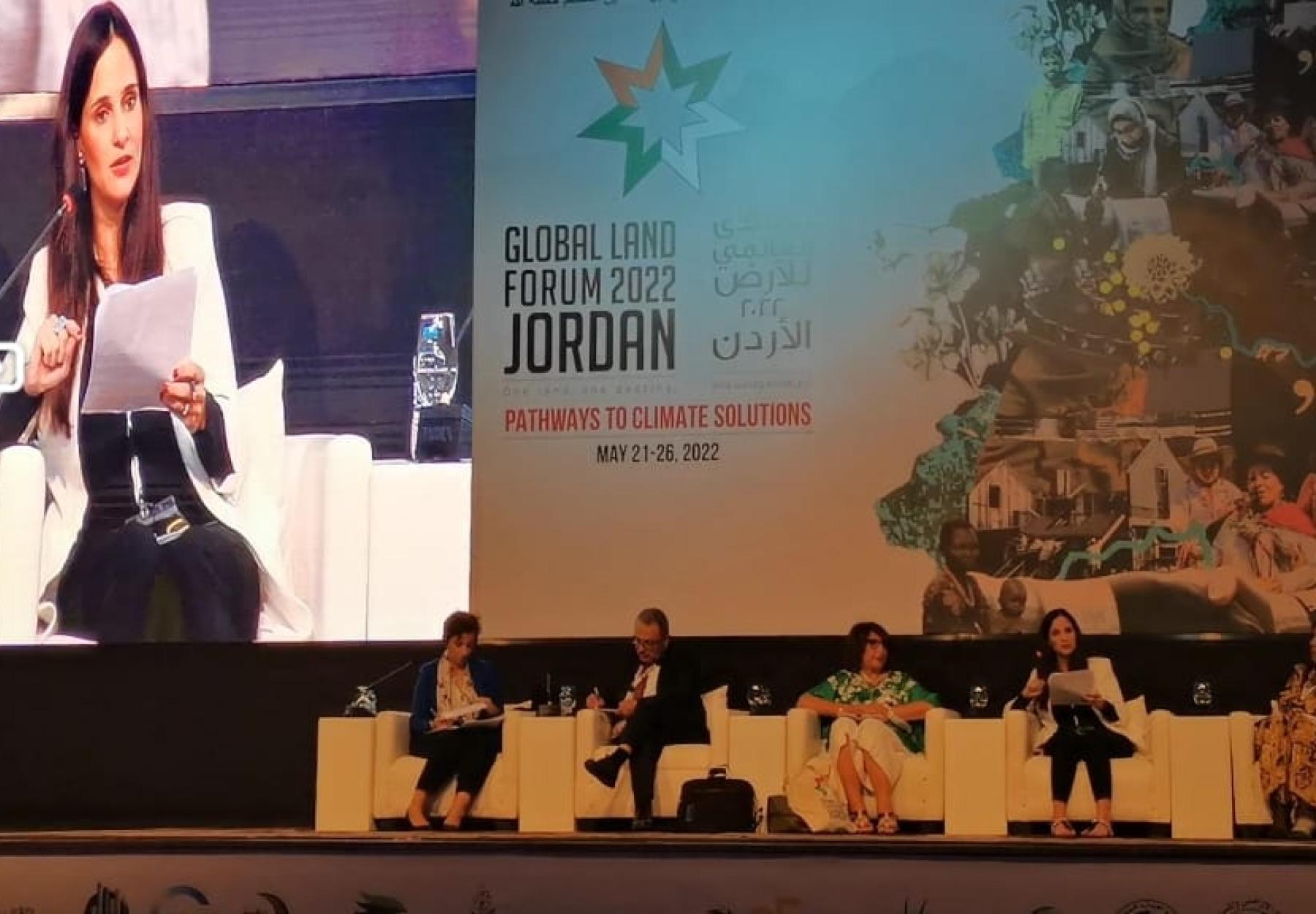
APN | Dead Sea
23 May 2022
APN General Manager, Mariam Al Jaajaa, was invited to speak at the 9th Global Land Forum, organized by the Jordanian Ministry of Agriculture, the Ministry of Environment, and the Global Land Alliance, with support from the International Fund for Agricultural Development. The session, in which she was a panelist, was titled "Integration in the Arab Region for Establishing a Unified and Sustainable Society, Peace and Conflicts". Moderated by Maria Hadjitheodosiou, the EU Ambassador in Jordan, the discussion aimed to underscore how Arab integration can contribute to tackling the escalating challenges in the region, particularly those related to food, climate, and economy.
During the presentation, Al Jaajaa highlighted APN's vision, emphasizing that the idea of food sovereignty constitutes a fundamental right and should be regarded as a strategic imperative. This viewpoint was substantiated by the various political, health, and economic crises that have unfolded, particularly over the last two decades.
She exposed the marginalization of the agricultural sector in the Arab region, which largely depends on imports and cultivates only 30% of its arable land (about 200 million hectares). A significant portion of the unused land relies on rainfall for irrigation, indicating that the often-cited water scarcity in our region, assumed to be the primary cause for agricultural decline, holds little substance. One could even argue that significant prospects exist for improving water use management and efficiency, alongside efforts to foster Arab integration between nations aimed at addressing water scarcity challenges.
Al Jaajaa's contribution also delved into policies that exerted a significant influence on the distribution and utilization of land, chiefly through the commercialization and speculative handling of land. Presently, land is valued based on its market worth rather than its inherent productivity. Moreover, the liberalization of interest rates on loans has imposed a considerable burden on farmers, leading to a substantial number of defaults on repayments and causing reluctance in cultivation, ultimately compelling some to sell their land.
Al Jaajaa discussed the repercussions of the colonial era on the agricultural industry, highlighting how it involved the forcible seizure and essentially pillaging of land, resulting in an uneven distribution. The process of privatization further dismantled traditional management practices and shifted the land from a shared asset to fragmented parcels. This trajectory persisted in many post-colonial governments, where the focus on land management and planning favored real estate over agriculture, and capitalist farmers over small-scale ones.
Al Jaajaa put forth her suggestions, drawing from the conclusions of various consultative meetings involving 220 Arab civil society organizations and networks. She also referred to a comprehensive regional study undertaken in collaboration with UN-Habitat. The ten primary recommendations centered on the imperative to revitalize the agricultural sector in the Arab region within the framework of food sovereignty. This involved integrating civil society institutions and grassroots organizations into decision-making processes and establishing an Arab fund to bolster the cultivation of strategic crops like wheat.
Al Jaajaa emphasized the urgency of countering the appropriation of land and water by the Israeli occupation, advocating for the safeguarding of collective tenure systems, which encompass traditional methods, as a means to prevent conflicts. She also urged international collaboration to stop wars, occupation, and settler colonialism, and to mobilize support for adherence to international law.
After presenting APN’s programmes, Al Jaajaa pointed to the recent activity of distributing and planting 4,000 fruit trees in the village of Beit Hanina in occupied Jerusalem and later in other locations, to honor the journalist and martyr Shireen Abu Aklek, and asked the audience to pause for a moment of silence in tribute to her and other martyrs.
On the sidelines of the Land Forum, APN President Razan Zuayter and members of the APN Board hosted a dialogue session on Food security in the Arab region with a group of experts, including H.E. Haifa Al-Najjar, Minister of Culture, the United Nations Special Rapporteur on the Right to Food, Professor Michael Fakhry, the FAO Representative in Jordan Nabil Al-Assaf, Ombretta Tempra Programme Manager at the UN-Habitat, the Coordinator of the Indigenous Peoples' Movement for Self-Determination and Liberation (IPMSDL) – Beverly Longed, the Senior Human Rights Adviser to the United Nations Resident and Humanitarian Coordinator in Jordan – Christina Miniki, as well as representatives of grassroots agricultural organizations in Jordan and Palestine, and a team of volunteers and administrative staff.